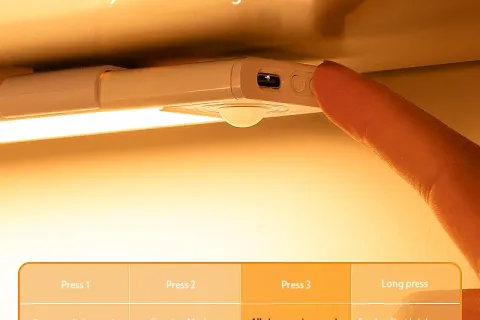A motion sensor hallway night light is an intelligent lighting device that combines a night light with a motion sensor. It detects the movement of the surrounding environment through a built-in motion sensor (usually an infrared sensor or a microwave sensor), and controls the switch of the light according to the sensed activity.
Generally, the service life of a high-quality LED light source is between 30,000 and 50,000 hours, which means that if used for 8 hours a day, the service life of the LED light source is about 10-17 years.
The working principle of infrared sensors is based on the detection of heat, so any temperature fluctuations may affect the response of the sensor. Sometimes, even if there is no object in the sensing range of the sensor, the sensor may misjudge and trigger the lamp to turn on.
Depending on the type and design of the lamp, the brightness of wireless motion sensor light can range from tens of lumens to thousands of lumens. Generally speaking, the lumen value of common wireless motion sensor light is usually between 300 and 1500 lumens.
For most families, warm light is the most suitable color for led bathroom night light. It can create a warm and comfortable environment without irritating the eyes, helping to improve safety at night.
✅ Check the indicator light status to see if there is any response ✅ Perform manual motion detection to observe whether the light responds to the movement ✅ Check the power supply status, replace the battery or check whether the USB power supply is normal ✅ Ensure that the ambient light is appropriate to avoid the light sensor misjudgment causing the light to not turn on ✅ Check the night light mode setting to ensure that it is in "Auto mode"
● There are still objects moving within the sensing range: adjust the installation position to avoid detecting unnecessary movement. ● Misjudgment of environmental factors: avoid installing near heat sources or electromagnetic interference areas. ● Delay time is too long: check the manual and set the time reasonably. ● Sensor or circuit failure: try to restart the device, replace the sensor if necessary or contact after-sales. ● Light sensing mode error: adjust the light sensing mode or turn off the light sensing function.
LED Motion Sensor Night Light usually has a specific sensing range (usually 2-5 meters) and sensing angle (usually 120° or 180°). If the user moves outside the sensing range, the sensor may not detect human motion, causing the light to turn off prematurely.
Places not suitable for installing LED Motion Sensor Night Light ● Areas exposed to direct sunlight (such as windows and balconies) ● Humid or splash-prone places (such as bathrooms and near kitchen sinks) ● Metal surfaces or large areas of metal (such as refrigerators and metal cabinets) ● Overheated environments (such as radiators, stoves, and air-conditioning outlets) ● Too narrow or enclosed spaces (such as drawers and inside cabinets) ● Areas with strong light interference (such as near TVs and computer screens)
✅ Adjust the sensing range: If the night light supports adjustment, reduce the sensing distance and angle. ✅ Optimize the installation location: Keep away from interference factors such as heat sources, air vents, windows, etc. ✅ Physical shielding: Use stickers or light shielding sheets to reduce the sensor's sensing range. ✅ Switch to low sensitivity mode: If the night light supports this function, the probability of false triggering can be reduced.
● Physical method: cover the sensor, adjust the installation position, or disconnect the sensor circuit. ● Electronic method: use manual mode, adjust the sensitivity, or turn off the motion detection function in the smart APP.
✅ Yes, but you need to choose the right tape, ensure sufficient adhesion, and avoid covering the sensor and heat dissipation parts. ❌ It is not recommended to use ordinary tape or cover key components, otherwise it may affect the sensing function, heat dissipation effect, and even shorten the life of the lamp.












